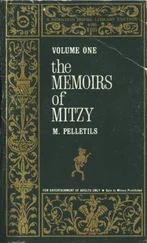Anthony Hamilton - The Memoirs of Count Grammont – Volume 04
Здесь есть возможность читать онлайн «Anthony Hamilton - The Memoirs of Count Grammont – Volume 04» — ознакомительный отрывок электронной книги совершенно бесплатно, а после прочтения отрывка купить полную версию. В некоторых случаях можно слушать аудио, скачать через торрент в формате fb2 и присутствует краткое содержание. Жанр: foreign_antique, foreign_prose, на английском языке. Описание произведения, (предисловие) а так же отзывы посетителей доступны на портале библиотеки ЛибКат.
- Название:The Memoirs of Count Grammont – Volume 04
- Автор:
- Жанр:
- Год:неизвестен
- ISBN:нет данных
- Рейтинг книги:4 / 5. Голосов: 1
-
Избранное:Добавить в избранное
- Отзывы:
-
Ваша оценка:
- 80
- 1
- 2
- 3
- 4
- 5
The Memoirs of Count Grammont – Volume 04: краткое содержание, описание и аннотация
Предлагаем к чтению аннотацию, описание, краткое содержание или предисловие (зависит от того, что написал сам автор книги «The Memoirs of Count Grammont – Volume 04»). Если вы не нашли необходимую информацию о книге — напишите в комментариях, мы постараемся отыскать её.
The Memoirs of Count Grammont – Volume 04 — читать онлайн ознакомительный отрывок
Ниже представлен текст книги, разбитый по страницам. Система сохранения места последней прочитанной страницы, позволяет с удобством читать онлайн бесплатно книгу «The Memoirs of Count Grammont – Volume 04», без необходимости каждый раз заново искать на чём Вы остановились. Поставьте закладку, и сможете в любой момент перейти на страницу, на которой закончили чтение.
Интервал:
Закладка:
Count Anthony Hamilton
The Memoirs of Count Grammont – Volume 04
CHAPTER EIGHTH
"Sir," said the Chevalier de Grammont, "the Prince de Conde besieged Lerida: the place in itself was nothing; but Don Gregorio Brice who defended it, was something. He was one of those Spaniards of the old stamp, as valiant as the Cid, as proud as all the Guzmans put together, and more gallant than all the Abencerrages of Granada: he suffered us to make our first approaches to the place without the least molestation. The Marshal de Grammont, whose maxim it was, that a governor who at first makes a great blustering, and burns his suburbs in order to make a noble defence, generally makes a very bad one, looked upon Gregorio de Brice's politeness as no good omen for us; but the prince, covered with glory, and elated with the campaigns of Rocroy, Norlinguen, and Fribourg, to insult both the place and the governor, ordered the trenches to be mounted at noon-day by his own regiment, at the head of which marched four-and-twenty fiddlers, as if it had been to a wedding.
"Night approaching, we were all in high spirits: our violins were playing soft airs, and we were comfortably regaling ourselves: God knows how we were joking about the poor governor and his fortifications, both of which we promised ourselves to take in less than twenty-four hours. This was going on in the trenches, when we heard an ominous cry from the ramparts, repeated two or three times, of, 'Alerte on the walls!' This cry was followed by a discharge of cannon and musketry, and this discharge by a vigorous sally, which, after having filled up the trenches, pursued us as far as our grand guard.
"The next day Gregorio Brice sent by a trumpet a present of ice and fruit to the Prince de Conde, humbly beseeching his highness to excuse his not returning the serenade which he was pleased to favour him with, as unfortunately he had no violins; but that if the music of last night was not disagreeable to him, he would endeavour to continue it as long as he did him the honour to remain before the place. The Spaniard was as good as his word; and as soon as we heard, 'Alerte on the walls,' we were sure of a sally, that cleared our trenches, destroyed our works, and killed the best of our officers and soldiers. The prince was so piqued at it, that, contrary to the opinion of the general officers, he obstinately persisted in carrying on a siege which was like to ruin his army, and which he was at last forced to quit in a hurry.
"As our troops were retiring, Don Gregorio, far from giving himself those airs which governors generally do on such occasions, made no other sally, than sending a respectful compliment to the prince. Signor Brice set out not long after for Madrid, to give an account of his conduct, and to receive the recompense he had merited. Your majesty perhaps will be desirous to know what reception poor Brice met with, after having performed the most brilliant action the Spaniards could boast of in all the war – he was confined by the inquisition."
"How!" said the Queen Dowager, "confined by the inquisition for his services!" "Not altogether for his services," said the Chevalier; "but without any regard to his services, he was treated in the manner I have mentioned for a little affair of gallantry, which I shall relate to the King presently.
"The campaign of Catalonia being thus ended, we were returning home, not overloaded with laurels; but as the Prince de Conde had laid up a great store on former occasions, and as he had still great projects in his head, he soon forgot this trifling misfortune: we did nothing but joke with one another during the march, and the prince was the first to ridicule the siege. We made some of those rhymes on Lerida, which were sung all over France, in order to prevent others more severe; however, we gained nothing by it, for notwithstanding we treated ourselves freely in our own ballads, others were composed in Paris in which we were ten times more severely handled. At last we arrived at Perpignan upon a holy-day: a company of Catalans, who were dancing in the middle of the street, out of respect to the prince came to dance under his windows: Monsieur Poussatin, in a little black jacket, danced in the middle of this company, as if he was really mad. I immediately recognized him for my countryman, from his manner of skipping and frisking about: the prince was charmed with his humour and activity. After the dance, I sent for him, and inquired who he was: 'A poor priest, at your service, my lord,' said he: 'my name is Poussatin, and Bearn is my native country: I was going into Catalonia to serve in the infantry, for, God be praised, I can march very well on foot; but since the war is happily concluded, if your lordship pleases to take me into your service, I would follow you everywhere, and serve you faithfully.' 'Monsieur Poussatin,' said I, 'my lordship has no great occasion for a chaplain; but since you are so well disposed towards me, I will take you into my service.'
"The Prince de Conde, who was present at this conversation, was overjoyed at my having a chaplain. As poor Poussatin was in a very tattered condition, I had no time to provide him with a proper habit at Perpignan; but giving him a spare livery of one of the Marshal de Grammont's servants, I made him get up behind the prince's coach, who was like to die with laughing every time he looked at poor Poussatin's uncanonical mien in a yellow livery.
"As soon as we arrived in Paris, the story was told to the Queen, who at first expressed some surprise at it: this, however, did not prevent her from wishing to see my chaplain dance; for in Spain it is not altogether so strange to see ecclesiastics dance, as to see them in livery.
"Poussatin performed wonders before the Queen; but as he danced with great sprightliness, she could not bear the odour which his violent motions diffused around her room the ladies likewise began to pray for relief; for he had almost entirely got the better of all the perfumes and essences with which they were fortified: Poussatin, nevertheless, retired with a great deal of applause, and some louis d'or.
"Some time afterwards I procured a small benefice in the country for my chaplain, and I have since been informed that Poussatin preached with the same ease in his village as he danced at the wedding of his parishioners."
The King was exceedingly diverted at Poussatin's history; and the Queen was not much hurt at his having been put in livery: the treatment of Gregorio Brice offended her far more; and being desirous to justify the court of Spain, with respect to so cruel a proceeding: "Chevalier de Grammont," said she, "what heresy did Governor Brice wish to introduce into the state? What crime against religion was he charged with, that he was confined in the inquisition?" "Madam," said he, "the history is not very proper to be related before your majesty: it was a little amorous frolic, ill-timed indeed; but poor Brice meant no harm: a school-boy would not have been whipped for such a fault, in the most severe college in France; as it was only for giving some proofs of his affection to a young Spanish fair one, who had fixed her eyes upon him on a solemn occasion."
The King desired to know the particulars of the adventure; and the Chevalier gratified his curiosity, as soon as the Queen and the rest of the court were out of hearing. It was very entertaining to hear him tell a story; but it was very disagreeable to differ with him, either in competition, or in raillery: it is true that at that time there were few persons at the English court who had merited his indignation: Russell was sometimes the subject of his ridicule, but he treated him far more tenderly than he usually did a rival.
Читать дальшеИнтервал:
Закладка:
Похожие книги на «The Memoirs of Count Grammont – Volume 04»
Представляем Вашему вниманию похожие книги на «The Memoirs of Count Grammont – Volume 04» списком для выбора. Мы отобрали схожую по названию и смыслу литературу в надежде предоставить читателям больше вариантов отыскать новые, интересные, ещё непрочитанные произведения.
Обсуждение, отзывы о книге «The Memoirs of Count Grammont – Volume 04» и просто собственные мнения читателей. Оставьте ваши комментарии, напишите, что Вы думаете о произведении, его смысле или главных героях. Укажите что конкретно понравилось, а что нет, и почему Вы так считаете.












